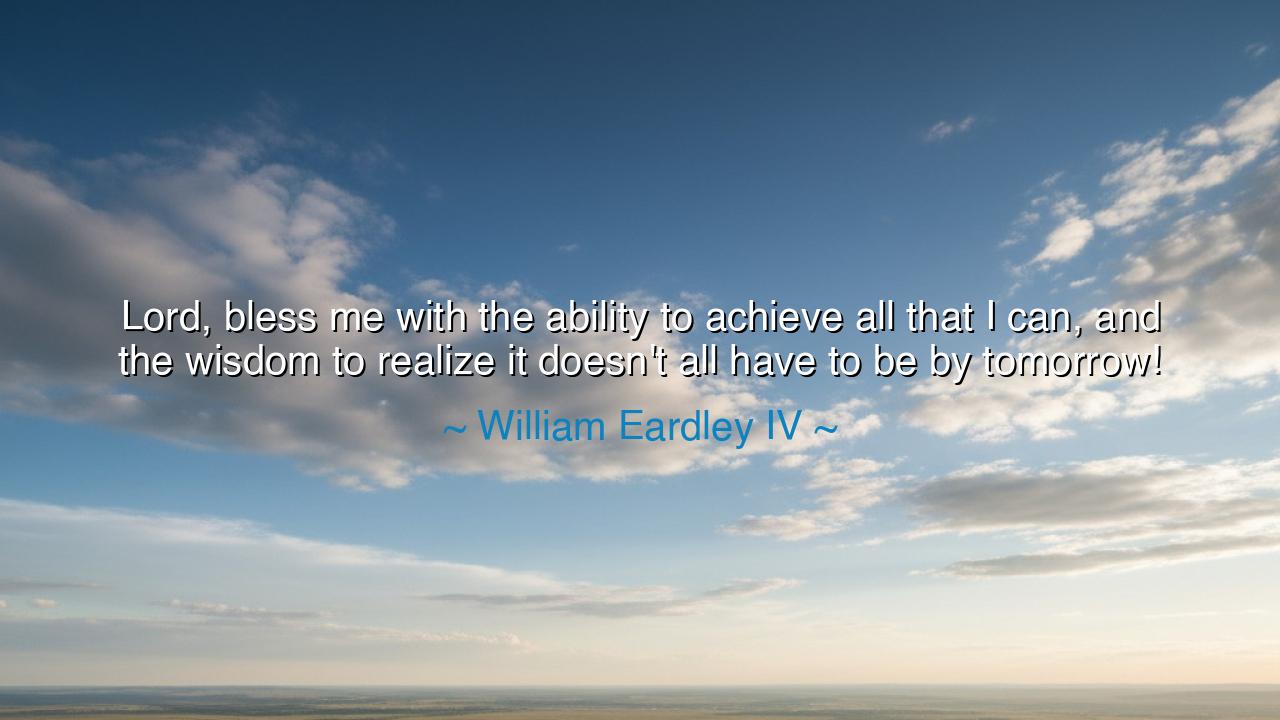
Lord, bless me with the ability to achieve all that I can, and
Lord, bless me with the ability to achieve all that I can, and the wisdom to realize it doesn't all have to be by tomorrow!






Hearken, children of the ages, to the earnest words of William Eardley IV, who prayed: “Lord, bless me with the ability to achieve all that I can, and the wisdom to realize it doesn't all have to be by tomorrow!” In these words lies the eternal truth of human ambition, patience, and divine guidance. The mortal heart longs to accomplish greatness, to stretch the limits of skill and spirit, yet it is tempered by the wisdom of timing, that not all triumphs need to be seized at once, nor all dreams fulfilled in a single day.
Eardley teaches that ability and insight must walk hand in hand. Strength without discernment can lead to folly, and urgency without patience breeds frustration. To ask for both the power to achieve and the wisdom to pace oneself is to honor the natural rhythms of life, acknowledging that growth, mastery, and accomplishment unfold over time. True success is measured not by haste, but by steady progress guided by understanding.
Consider the life of Leonardo da Vinci, who labored for decades on sketches, experiments, and inventions. His genius was boundless, yet he understood—through patience and reflection—that the fruits of his labor could not all ripen at once. Each painting, each invention, each study was a step in a greater journey. Da Vinci embodies Eardley’s wisdom: the pursuit of all that one can achieve is noble, but the understanding of temporal pacing is equally vital to enduring fulfillment.
The ancients themselves extolled the virtue of patience alongside effort. The Stoics taught that virtue, mastery, and wisdom cannot be rushed; even the most ambitious endeavors require temperance and reflection. Eardley’s prayer echoes this ancient counsel: to strive is noble, but to temper ambition with understanding of the natural order of time is divine insight.
Thus, his words are both guidance and solace: mortals may aim high and labor diligently, yet they must also cultivate the wisdom to know that the unfolding of life need not be immediate. Success achieved with foresight, care, and patience endures, while the rush to seize all at once risks exhaustion, error, and disillusionment.
Carry this teaching, children of generations yet to come: seek the blessing of ability, pursue your ambitions with vigor, and cultivate the wisdom to honor the rhythm of time. For in the union of effort and patience lies the path to fulfillment, achievement, and the serenity of knowing that greatness unfolds in harmony with the divine order of life.






KABanh thi Kim anh
This reflection feels beautifully grounded. It’s about striving without losing perspective, ambition balanced by grace. I think it speaks to the modern struggle with time—wanting to do everything, everywhere, all at once. But wisdom reminds us that pace matters as much as purpose. I’m curious: how do we train ourselves to embrace slow progress without feeling like we’re falling behind? Maybe contentment isn’t found in speed, but in sustainable effort.
HDHieu Dang
I love the humor and honesty in this line—it’s both a prayer and a reality check. It reminds me that ambition without patience can turn into anxiety. There’s wisdom in slowing down and recognizing that even great accomplishments take time to bloom. I wonder if Eardley is also speaking to gratitude: that the ability to work toward something meaningful is itself a blessing, regardless of how quickly it’s achieved.
ADDang Ngoc Anh Duc
This quote hits home for me, especially as someone who struggles with perfectionism. It’s so easy to believe that every dream must be realized now. But Eardley captures something liberating: the idea that timing is as important as effort. It makes me think about how impatience often undermines achievement. Maybe faith, in this sense, isn’t about expecting miracles overnight, but believing that persistence guided by wisdom leads to lasting success.
THTran Huyen
What strikes me about this quote is its humility. It’s not just asking for success, but for perspective—the understanding that not everything must happen immediately. In a culture that equates speed with success, this feels countercultural. I wonder how much happier people would be if they accepted that growth takes time. Perhaps wisdom isn’t about knowing how to win fast, but about trusting the process and appreciating small, steady progress.
UGUser Google
This sentiment feels like a prayer for both motivation and restraint. It acknowledges the human tendency to rush through life chasing goals, yet it also recognizes that fulfillment requires time and grace. I find it comforting because it reminds me that delays don’t mean failure. Maybe real wisdom is knowing when to act and when to pause. How can we cultivate that inner patience while still staying passionate about our goals?